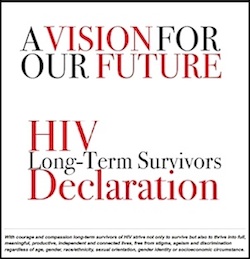 |
| Click on the image to read and download the declaration. |
The grassroots movement called Let’s Kick ASS (AIDS Survivor Syndrome) published its “HIV Long-Term Survivors Declaration,” an eight-page document that spells out the challenges and needs of long-term survivors, while offering insight and self-empowerment for this population.
While calling for ideas, dialogue and solutions, the document also creates a vision for the future of long-term survivors. The document begins, in part:
Long-term survivors now find our voices muted. Our issues are sidelined by the agencies we helped to form. Conferences devoted to HIV are focused on newer topics while relegating long-term survivors to the sidelines and affinity sessions off the main stage.
Our marginalization exacts a toll our mental health, which in turn affects our overall physical health and quality of life. The White House updated the National HIV/AIDS Strategy for the U.S. in July 2015 with no mention of the experiences or the lived reality of long-term survivors.
Now is the time to reclaim our silenced voices and ensure that long-term survivors’ perspectives are not ignored. With talk about the End of AIDS and campaigns like Getting to Zero, it becomes vital that we take care of and acknowledge long-term survivors.
We are into the fourth decade of the HIV epidemic and half the people living with HIV are age 50 and older. By 2020 that number will be 70 percent. This is a wakeup call to focus on the needs and reality of older individuals aging with HIV. Because we had the audacity to survive we now face a host of challenges few of us could have predicted.
The declaration stresses that Let’s Kick ASS, which was founded by Tez Anderson, is “not a movement simply about nostalgia, pain and grief. It is also a testament to the resilience of the human spirit, to humans who rolled up their sleeves and refused to accept our death sentences.”
To read and download the declaration, click here.
And to read a 2014 POZ opinion piece by Anderson about the launch of the National HIV/AIDS Long-Term Survivors Awareness Day, observed each June 5, click here.






6 Comments
6 Comments